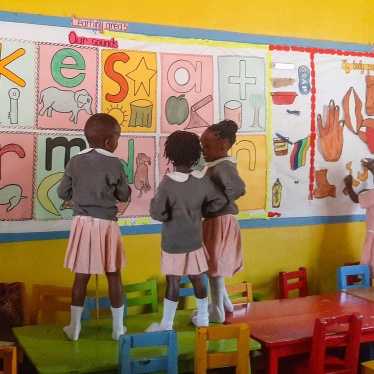The South African government’s neglect of schools on commercial farms prevents thousands of rural children from receiving an adequate education, Human Rights Watch said in a new report released today. Farm schools provide the only educational opportunity for farm workers’ children in South Africa.
The 59-page report, “Forgotten Schools: Right to Basic Education for Children on Farms in South Africa,” found that the government’s failure to negotiate contracts with farm owners impedes children’s right to basic education. In the worst cases, farm owners have deliberately obstructed children's access to the schools.
“Rural children attending farm schools should be enjoying the fruits of South Africa's decade of democracy,” said Nobuntu Mbelle, South Africa researcher in Human Rights Watch’s Africa Division. “Yet the advances made in public education elsewhere in South Africa have yielded few benefits for children on commercial farms.”
The neglect of farm schools—officially known as “public schools on private property”—results in children's attending dilapidated schools often without running water and electricity. Delivery of these key services is determined in contracts between the state and farm owner. Despite national policies enacted in 1996 that mandate contracts for all schools within six months, the government has yet to negotiate with farmers in a majority of instances.
The report documents cases where farm owners or managers prevent learners and teachers from getting to school by locking school facilities or obstructing access otherwise, generally due a lack of contractual arrangements. While the police and authorities from the provisional departments of education intervene on occasion to ensure access, such intervention has not prevented further interference at the same schools.
“Children who try to receive an education are caught between the landowners’ private interests and the state's meager attempt to meet its obligations,” said Mbelle. “The children become the unintended victims of government inaction.”
Most farm schools consist of a simple classroom, often in need of repair. Children attend schools without drinking water or proper sanitation, putting them at unnecessary risk of disease. Regulations under the South African Schools Act of 1996 require the state, or where applicable the landowner, to provide basic services to farm schools.
The lack of state-funded transport from homes to schools further hinders access to education in commercial farm areas. Two-thirds of the children, some as young as eight years old, who attend farm schools in Limpopo Province travel to school on foot up to 30 kilometers (18 miles) each morning. Such exhausting conditions adversely affect the ability of these children to adequately participate in activities in the classroom. This results in poor performance, nonattendance or regular absences. In particular, girls face the risk of sexual assault when walking several hours to and from school each day.
Human Rights Watch called on the South African government to protect the farm worker children’s right to a basic education on commercial farms. The government should insist on the speedy conclusion of contracts between provincial departments of education and farm owners in order to ensure that children get the education they need.







